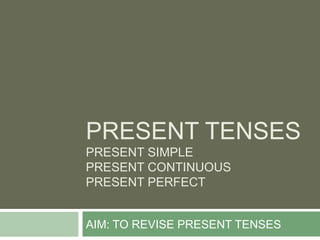
Lesson 5 present tenses
- 1. PRESENT TENSES PRESENT SIMPLE PRESENT CONTINUOUS PRESENT PERFECT AIM: TO REVISE PRESENT TENSES
- 2. 1. I’m learning Chinese. 2. You’ve walked across the Amazon jungle. 3. It has meant that I can finance my next expedition. 4. My mum and dad always watch my documentaries. 5. My agent is waiting for me. 6. I’ve always loved travelling. 7. I don’t like going with groups.
- 3. Answers 1. I’m learning Chinese. – Present Continuous 2. You’ve walked across the Amazon jungle. – Present Perfect 3. It has meant that I can finance my next expedition. – Present Perfect 4. My mum and dad always watch my documentaries. – Present Simple 5. My agent is waiting for me. – Present Continuous 6. I’ve always loved travelling. – Present Perfect 7. I don’t like going with groups. - Present Simple
- 4. Present Simple I live in Belgrade. We live in Belgrade. You live in Belgrade. You live in Belgrade. He/She/It lives in They live in Belgrade. Belgrade.
- 5. Present Simple - questions Do I live in Do we live in Belgrade? Belgrade? Do you live in Do you live in Belgrade? Belgrade? Does he/she/it live Do they live in in Belgrade? Belgrade?
- 6. Present Simple - negative I don’t live in We don’t live in Belgrade. Belgrade. You don’t live in You don’t live in Belgrade. Belgrade. He/she /it doesn’t They don’t live in live in Belgrade. Belgrade.
- 7. We use the Present Simple to talk about: Activities that we repeat regularly (routines, habits). My mum and dad always watch my documentaries. Permanent situations and states. I don’t like cheese. General truths A doctor works in a hospital. Common time adverbials: always, often, usually, sometimes, never every day, every week, every year ... twice a week, once a month regularly, seldom, hardly ever, occasionally
- 8. Spelling Y is lost in verbs We use –es with ending in consonant verbs ending in -s, +y: -z, -sh, -ch, -s, -x: fly – flies watches, teaches, study – studies washes, fixes... -es where you wouldn’t normally expect it does goes
- 9. Present Continuous I am watching TV. We are watching TV. You are watching TV. You are watching He/she/it is watching TV. TV. They are watching TV.
- 10. Present Continuous - questions Am I watching TV? Are we watching Are you watching TV? TV? Are you watching Is he/she/it watching TV? TV? Are they watching TV?
- 11. Present Continuous - negative I am not watching We are not watching TV. TV. You are not You are not watching TV. watching TV. He/she/it is not They are not watching TV. watching TV.
- 12. We use the Present Continuous to talk about: Activities that are going on at the time of speaking. Right now, I am giving a lecture and you are listening. Activities that happen regularly but only for a limited period of time (temporary routines and habits). I’m studying English a lot these days because we are having a test next week. Common time adverbials:
- 13. Spelling Verbs ending in –e lose Short verbs ending in the final -e when –ing is one vowel + one added. consonant double the phone – phoning last consonant. make – making sit – sitting change – changing cut – cutting swim – swimming Verbs ending in –ie: lie – lying tie – tying
- 14. Present Perfect: have/has +3rd column I have done the We have done the homework. homework. You have done the You have done the homework. homework. He/she/it has done They have done the the homework. homework.
- 15. Present Perfect - Questions Have I done the Have we done the homework? homework? Have you done the Have you done the homework? homework? Has he/she/it done Have they done the the homework? homework?
- 16. Present Perfect - negative I have not done the We have not done homework. the homework. You have not done You have not done the homework. the homework. He/she/it has not They have not done done the homework. the homework.
- 17. We use the Present Perfect to talk about: Past events and activities with results or consequences in the present. I’ve lost my keys and now I can’t open the door. An action in the past when we don’t know or are not interested in when it happened. (to talk about experience) I’ve been to China. Things that started in the past and continue up till now. I’ve always wanted to travel. Common time adverbials: never, ever, since, for, already, yet, all my life, always
- 18. The use and meanings of time adverbials already and yet since and for We use already in Since tells us about a statements and yet in point in time when the questions and activity began. negative sentences. We’ve been friends I’ve already seen that since 2003. film. For tells us about the I haven’t finished yet. period of time that the activity has taken. We’ve been friends for five years.
- 19. Do the matching task Write the use(s) for each example presented in diapo nº 2. Only Present Simple and Present Continuous.
- 20. Revision Give a wider context for each of the sentences below. I write emails. I’m writing an email. I’ve written an email.
